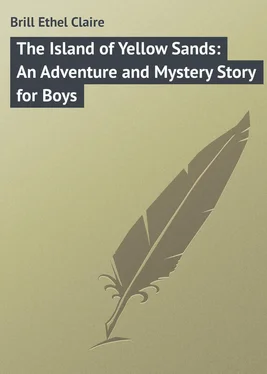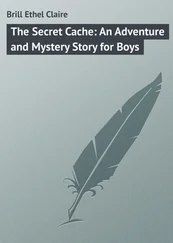Ethel Brill - The Island of Yellow Sands - An Adventure and Mystery Story for Boys
Здесь есть возможность читать онлайн «Ethel Brill - The Island of Yellow Sands - An Adventure and Mystery Story for Boys» — ознакомительный отрывок электронной книги совершенно бесплатно, а после прочтения отрывка купить полную версию. В некоторых случаях можно слушать аудио, скачать через торрент в формате fb2 и присутствует краткое содержание. Жанр: foreign_prose, Прочие приключения, foreign_language, на английском языке. Описание произведения, (предисловие) а так же отзывы посетителей доступны на портале библиотеки ЛибКат.
- Название:The Island of Yellow Sands: An Adventure and Mystery Story for Boys
- Автор:
- Жанр:
- Год:неизвестен
- ISBN:нет данных
- Рейтинг книги:4 / 5. Голосов: 1
-
Избранное:Добавить в избранное
- Отзывы:
-
Ваша оценка:
- 80
- 1
- 2
- 3
- 4
- 5
The Island of Yellow Sands: An Adventure and Mystery Story for Boys: краткое содержание, описание и аннотация
Предлагаем к чтению аннотацию, описание, краткое содержание или предисловие (зависит от того, что написал сам автор книги «The Island of Yellow Sands: An Adventure and Mystery Story for Boys»). Если вы не нашли необходимую информацию о книге — напишите в комментариях, мы постараемся отыскать её.
The Island of Yellow Sands: An Adventure and Mystery Story for Boys — читать онлайн ознакомительный отрывок
Ниже представлен текст книги, разбитый по страницам. Система сохранения места последней прочитанной страницы, позволяет с удобством читать онлайн бесплатно книгу «The Island of Yellow Sands: An Adventure and Mystery Story for Boys», без необходимости каждый раз заново искать на чём Вы остановились. Поставьте закладку, и сможете в любой момент перейти на страницу, на которой закончили чтение.
Интервал:
Закладка:
“Fringue, fringue, sur la rivière,
Fringue, fringue, sur l’aviron.”
“Speed, speed on the river,
Speed, speed with the oar.”
Making good time, they continued northward into Michipicoten Bay. On the Michipicoten River, which empties into the head of the bay, was a trading station. They did not wish to land there, but hoped to pass unobserved and to avoid any one going to or coming from the post. It was late in the season for white men to be traveling towards the western end of the lake, and questions or even unspoken curiosity might be embarrassing.
So, on reaching a beach, the only one they noticed along that bold, steep stretch of shore, they decided to land and wait for darkness before running past the post.
The manito continued to be kind to them, for during the afternoon a haze spread over the sky. When the fog on the water became thick enough to furnish cover, the adventurers set out again, paddling along the steep shore, gray and indistinct in the mist, the Indian keeping a sharp lookout for detached rocks. As they neared the mouth of the Michipicoten, they went farther out, and passed noiselessly, completely hidden in the fog. Not caring to risk traveling in the thick obscurity of a foggy night, they made camp before dark a few miles beyond the river.
The next morning they embarked at dawn and went on under cover of the fog, but the rising sun soon dispersed it. They were now traveling directly west. After passing Point Isacor, they could see clearly, ten or twelve miles to the south, Michipicoten Island or Isle de Maurepas, as the French named it, after the Comte de Maurepas, minister of marine under Louis XV. Alexander Henry the elder visited that island, and it was the Indians who guided him there who told him of another isle farther to the south, where the sands were yellow and shining. According to Nangotook, those Indians had deliberately deceived the white man, taking him intentionally to the wrong island. The boys gazed with new interest at the high pile of rock and forest, and Jean related to Ronald a legend that one of the old French missionaries had heard from the savages more than a century before and had written down.
“The savages told the good Father,” began Jean, “that four braves were lost in a fog one day, and drifted to that island. Wishing to prepare food, they began to pick up pebbles, intending to heat them in the fire they had lighted, and then drop them into their basket-ware kettle to make the water boil. But they were surprised to find that all the pebbles and slabs on the beach were of pure copper. At once they began to load their canoe with the copper rocks, when they were startled by a terrible voice calling out in wrath. ‘Who are you,’ roared the great voice, ‘you robbers who carry away my papoose cases and the playthings of my children?’ The slabs, it seems, were the cradles, and the round stones, the toys, of the children of the strange race of manitos or supernatural beings who dwelt, like mermen and mermaids, in the water round about the island. The frightful voice terrified the savages so they dropped the copper stones, and put out from the shore in haste. One of them died of fright on the way to the mainland. A short time later a second died, and then, after he had returned to his own people and told the story, the third. What became of the fourth the savages did not say. It is said,” concluded Jean, “that the island is rich in copper and other metals, so it well may be, as Etienne suggests, that such tales were told to frighten the white men and keep them from the place.”
That night the eager gold-seekers traveled until after midnight, pausing at sundown only long enough for supper and a brief rest. As the darkness deepened, the wavering flames of the aurora borealis, or northern lights, began to glow in the northern and western sky. From the sharply defined edge of bank of clouds below, bands and streamers of white and pale green stretched upwards, flashing, flickering and changeable. Sometimes glowing spots appeared in the dark band, again streamers of light shot up to the zenith, the center of brightness constantly shifting, as the flames died out in one place to flare up in another.
The Ojibwa hailed the “dancing spirits” as a good omen, and the boys were inclined to agree with him. All the evening the lights flashed and glowed, but when, after midnight, the travelers rounded the cape known as Otter’s Head, from the upright rock surmounting it, the streaks and bands were growing faint, and by the time a landing had been made in the cover beyond, they had faded out entirely.
Whether the aurora borealis was to be considered a good sign or not, fortune continued to favor the voyageurs the next day. They put up a blanket sail attached to poles, and ran before a favorable wind most of the twenty-five miles to the mouth of White Gravel River. There they remained until nightfall, for they were anxious to avoid another trading post some twenty miles farther up the shore, near the mouth of the Pic River.
Glad of exercise after being cramped in the canoe, the boys made their way along the bank of White Gravel River for about two miles, where they discovered a round, deep, shaded pool, alive with darting shadows. They cut fishing poles and had an hour of fine sport. As they were going on up-stream, they heard the calling and cooing of wood pigeons, and soon came upon a great flock of the birds. The trees were covered with them, and the air fairly full of them, flying up, darting down, and wheeling about in the open spaces, singly and in squads and small flocks. So plentiful were the pigeons, and so little disturbed by the lads’ presence, that the two might have killed hundreds had they chosen, but they were not greedy or wanton sportsmen, and shot only as many as they thought they could eat for supper, reserving the trout for breakfast.
A grove of trees and bushes hid the camp, and the canoe was beached on the inner side of the sand-bar that partly concealed the entrance to the stream. Ever since Etienne had seen Le Forgeron Tordu at Montreal River, he had taken precautions to select camping places where the three would not be noticed by any one passing on the lake. If the Twisted Blacksmith were coming up the shore on some business of his own that had nothing to do with them, the gold-seekers had no wish to attract his attention. If he was following them, they hoped to give him the slip. Just as the sun was setting that night, as Jean was plucking the pigeons and Ronald was preparing to kindle the cooking fire, their attention was attracted by the harsh screaming of gulls. Looking out through their screen of bushes, the lads saw a canoe, about the size of their own, passing a little way out. It was going north, and contained two men, one evidently an Indian, the other from his dress a white man or half-breed. The boys could not see him plainly enough to be sure, but they had little doubt the white man was Le Forgeron. Etienne was some distance away gathering bearberry leaves to dry and mix with his smoking tobacco to make kinni-kinnik. So he did not see the canoe go by.
The sight of the passing voyageurs caused the three to delay going on until twilight had deepened to darkness, and then they traveled in silence, and watched the shore closely for signs of a camp. They saw none, however, ran past the mouth of the Pic without encountering any one, and landed in a bay a few miles farther on. Ahead of them lay a very irregular shore with many islands, rocks and reefs, which they did not dare to try to thread in the darkness.
In spite of their night run, they embarked early and passed through a labyrinth of islands. In a winding passage they met a canoe containing an Indian, his squaw, three children and two pointed-nosed, fox-eared dogs. The boys thought this Indian family particularly unattractive looking savages. They had very flat faces and large mouths and were ragged and disgustingly dirty, but they were evidently good-natured and ready to be friendly, for man, woman and children grinned broadly as they called out “Boojou, boojou,” the Indian corruption of the French “Bonjour.” The man held up some fish for sale, but Nangotook treated him with dignified contempt, grunting an unsmiling greeting, shaking his head at the proffered fish, and passing by without slowing the strokes of his paddle. As he left the Indian canoe astern, he growled out a name that Ronald could not make out, but that Jean understood.
Читать дальшеИнтервал:
Закладка:
Похожие книги на «The Island of Yellow Sands: An Adventure and Mystery Story for Boys»
Представляем Вашему вниманию похожие книги на «The Island of Yellow Sands: An Adventure and Mystery Story for Boys» списком для выбора. Мы отобрали схожую по названию и смыслу литературу в надежде предоставить читателям больше вариантов отыскать новые, интересные, ещё непрочитанные произведения.
Обсуждение, отзывы о книге «The Island of Yellow Sands: An Adventure and Mystery Story for Boys» и просто собственные мнения читателей. Оставьте ваши комментарии, напишите, что Вы думаете о произведении, его смысле или главных героях. Укажите что конкретно понравилось, а что нет, и почему Вы так считаете.












